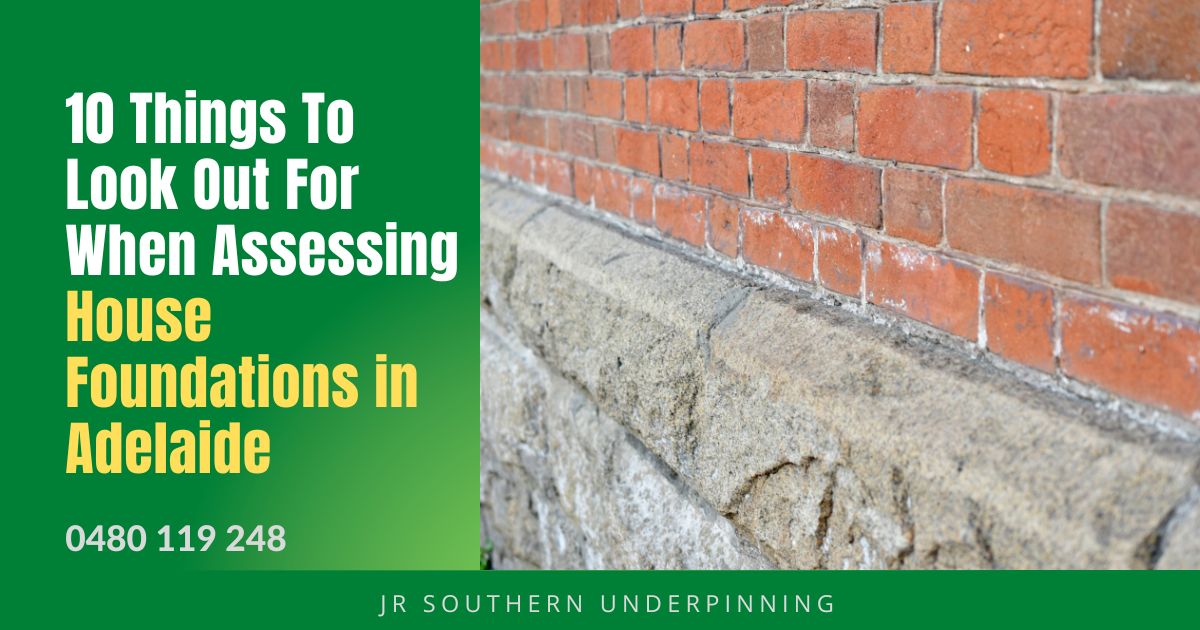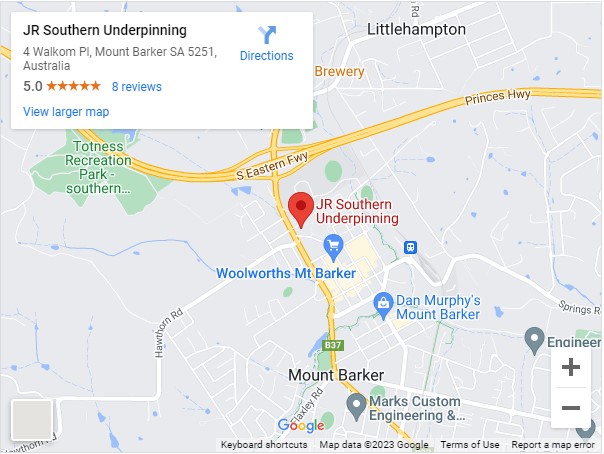Assessing your home’s foundation is paramount, as it is the bedrock upon which your property stands. A solid foundation ensures the structural integrity of the building, preventing potential damages and preserving the safety of its occupants.
Any issues in the foundation, if left unchecked, could lead to severe and costly repairs in the future. Thus, regular assessment of your home’s foundation can help in the early detection of problems, ensuring timely remediation and preserving the longevity and value of your property.
In this blog, we share 10 things to look out for when assessing your home’s foundation in Adelaide.
1. Cracks and Fractures:
These can appear on your walls, floors, and the foundation. They are usually an early warning sign of underlying structural problems.
Cracks and fractures are vital to scrutinise when assessing a home’s foundation. They often serve as the first telltale signs of potential structural issues. Ignoring these seemingly small fissures can lead to severe consequences, as they may grow over time and compromise the overall stability of the property.
Furthermore, cracks and fractures can facilitate moisture entry, leading to dampness, mould growth, and damage to the building’s infrastructure. Therefore, timely identification and corrective measures of cracks and fractures in a home’s foundation are crucial in maintaining the longevity and value of an Adelaide property.
2. Uneven or Sloping Floors:
If your floors are not level or sloping to one side, this could indicate a shifting or sinking foundation.
Uneven or sloping floors can often be an early sign of foundation issues in a home. In many cases, this can manifest as a slow, almost unnoticeable decline in floor level or, in more severe instances, a noticeable slant. This is typically caused by soil settlement beneath the home, which can place uneven pressure on the foundation, leading to movement and distortion. It’s crucial to watch for these signs when inspecting an Adelaide home for foundation problems. Early detection and intervention can prevent minor issues from escalating into significant damage, saving homeowners time and money in the long run.
3. Door and Window Issues:
Difficulty opening doors and windows, or gaps seen around them, can be symptoms of foundation movement.
Indeed, door and window issues are a tell-tale sign of potential foundation problems and should not be overlooked, regardless of whether the home is in Adelaide. If your doors or windows stick, it may indicate a shift or a crack in the foundation. Furthermore, if you notice gaps around the doors or windows or see cracks running up around these areas, it could be a symptom of significant foundation distress. Thus, for homeowners in Adelaide, it’s crucial to include door and window checks in any foundation assessment to ensure the property’s structural integrity.
4. Water Damage and Moisture:
Excessive moisture or water pooling in the basement can damage the foundation over time.
Inspecting for water damage and moisture is a crucial step in evaluating the health of a home’s foundation. In extreme cases, prolonged water exposure can weaken the foundation, causing cracks, shifts, and structural failures. Water damage indicators could include visible water stains, efflorescence, mould growth, or a musty smell. Therefore, a thorough assessment of these factors should be considered during a home inspection. Employing a professional inspector who can use advanced tools and expertise to identify potential issues accurately is advisable.
5. Bowing Walls:
Walls that bow or lean significantly may suggest that the foundation cannot bear the house’s weight.
In Adelaide, bowing walls are uncommon due to the region’s clay-rich soil conditions. The seasonally fluctuating moisture content can cause the soil to expand and contract, applying substantial pressure to the home’s foundation. Over time, this can lead to the walls bowing or curving inwards, indicating potential foundation issues. Therefore, when assessing property in Adelaide, it’s crucial to thoroughly inspect for signs of turning walls as it could signify underlying structural problems requiring immediate attention.
6. Gaps in Exterior Bricks:
Gaps or cracks in the exterior brickwork are another sign of potential foundation issues.
Gaps in exterior bricks, often called ‘frosting’, are a critical indicator of potential foundation issues. They can emerge due to fluctuations in climate, soil movement, or simple wear and tear over time. In Adelaide, with its hot-summer Mediterranean climate, these gaps can widen due to thermal expansion and contraction. Therefore, inspecting for such gaps is essential during a home foundation assessment. They may signify underlying issues, such as shifting or cracking foundations that require immediate attention. Consider seeking professional help if you notice significant gaps or a series of them, as addressing these problems early can prevent more substantial, costly repairs in the future.
7. Deteriorating Concrete:
If the concrete of your foundation is chipping or flaking, it could mean that the mix contains too much water or sand, weakening the structure over time.
Deteriorating concrete can be a telltale sign of foundational issues in a property. Over time, environmental factors such as weathering or ground movement can lead to the concrete cracking or crumbling, compromising the foundation’s structural integrity. This is an essential aspect to inspect in Adelaide, where the climate can vary. Potential homeowners should look for signs of flaking or chipping concrete and consider hiring a professional to conduct an in-depth assessment if any such issues are observed.
8. Pest Infestation:
A pest infestation can pose significant threats to the integrity of a home’s foundation, particularly in Adelaide , due to its unique climatic conditions that may invite specific pests. Termites, for instance, are prevalent pests in this region known for their destructive capabilities, often compromising the strength of wooden structures within foundations. They can burrow into the foundation, causing extensive damage that may not be immediately visible. Other pests, such as rodents, can create caves and tunnels that disrupt the soil, leading to settlement issues or even foundation collapse. Hence, when assessing an Adelaide home foundation, it is critical to check for signs of pest infestation to ensure the longevity and safety of the property.
9. Roof Damage:
When assessing a home’s foundation, inspecting the roof for damage is equally important. This is because issues with the roof, such as leaks or improper drainage, can lead to water accumulation around the home’s base, further increasing the risk of foundation damage. Moreover, a compromised roof can alter the weight distribution of the structure, which can cause the foundation to shift. Hence, a thorough foundation assessment should always include a roof check for comprehensive and accurate results.
10. Checking Fixtures:
Assessing fixtures like plumbing, electricity, and appliances is crucial in evaluating a home’s foundations. These elements can provide early warning signs of underlying foundation issues. For instance, foundation movement can disrupt the plumbing system, leading to leaks that further exacerbate the problem.
Similarly, electrical wires and outlets may be affected, causing safety concerns. Appliances, particularly built-in ones, may exhibit misalignment or malfunction if the foundation shifts. Therefore, inspecting these fixtures is not just about checking their functionality but also about ensuring the overall structural integrity of the property.
Remember, early detection of these issues can prevent costly repairs in the future. It is always advisable to consult a professional if you notice any of these signs. In Adelaide, you can contact John at JR Southern Underpinning if you need help or require a quote.



